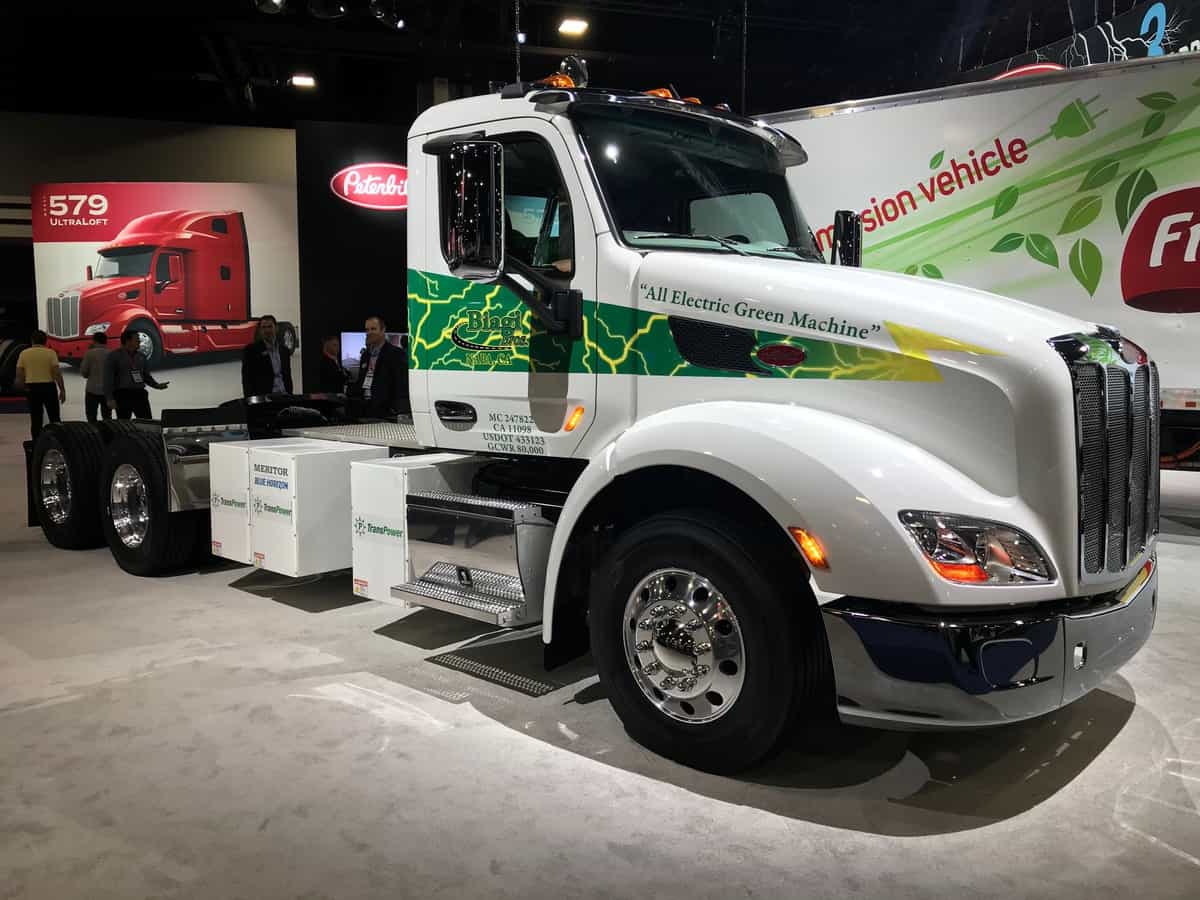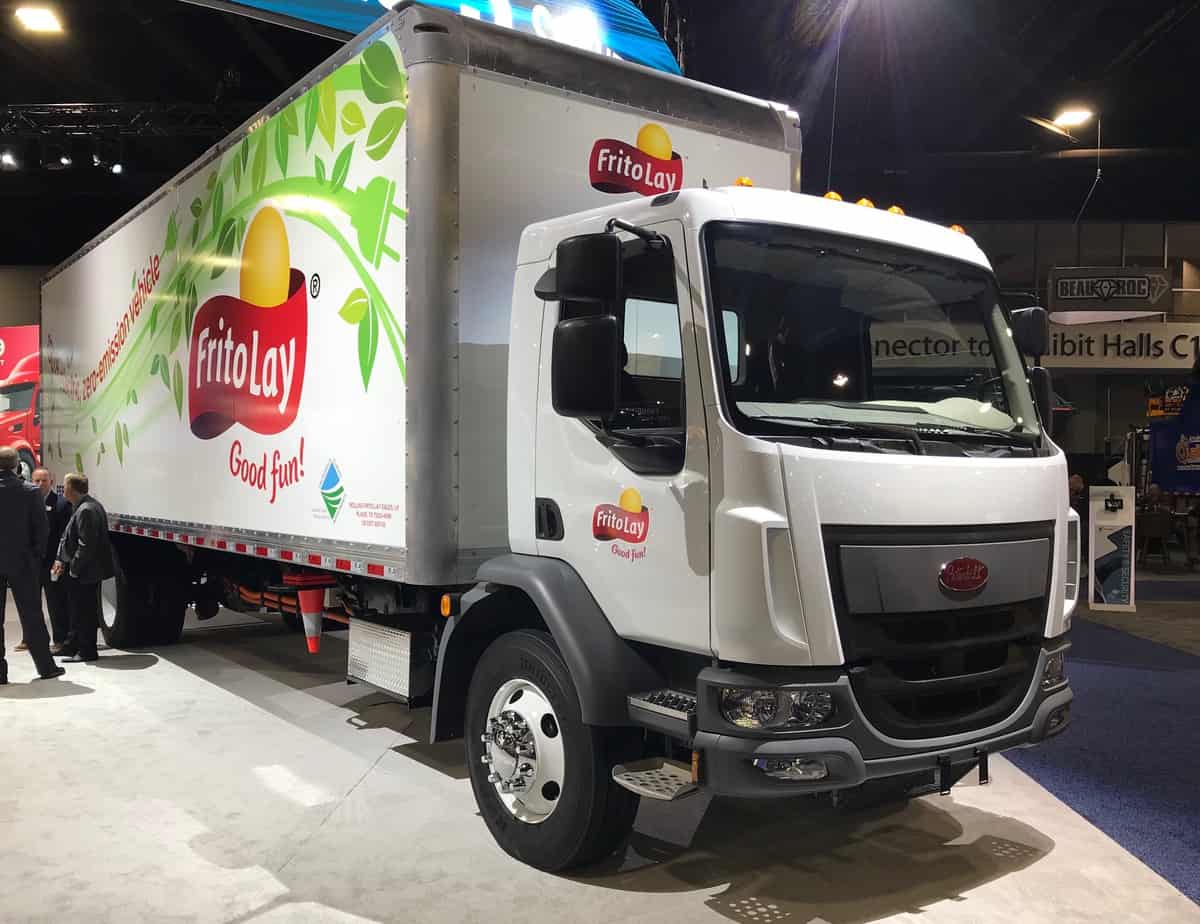Peterbilt Motors Co. will set prices for deliveries of battery-powered, zero-emission trucks by the middle of next year with limited sales by year-end.
The Paccar Inc. (NASDAQ: PCAR) unit is showing its three electric vehicle configurations for refuse, regional haul and city delivery at the North American Commercial Vehicles Show in Atlanta. All three are in demonstration use by customers.
“Peterbilt’s comprehensive electric vehicle lineup allows us to support our customers’ diverse needs,” said Jason Skoog, Paccar vice president and Peterbilt general manager.
The number of Peterbilt electric trucks will grow from the current 16, including a dozen regional haul day cabs, to 36 by the end of the first quarter.
Demo units
Biagi Bros. placed the Model 579EV in service in October. It uses a 264 kilowatt-hour TransPower energy storage subsystem driven by a 430-horsepower Meritor Blue-Horizon mid-ship motor drive subsystem. It can travel about 133 miles on a single charge and recharge in an hour with a fast-charging system.

PepsiCo’s Frito Lay division took delivery of the first Peterbilt 220EV in early October. It is powered by two TransPower battery packs with a total storage capacity of 148 kWh, and a Meritor Blue-Horizon two-speed drive eAxle with up to 335 horsepower. It can travel more than 100 miles on a single charge and recharge in one hour by fast-charging.

The Model 520EV designed for the refuse market is on display at the commercial vehicles show. It is powered by a 308-kWh TransPower energy storage subsystem. The mid-ship motor drive subsystem generates up to 430 horsepower. It has a 100-mile range on a single charge and recharges in about four hours.
Medium-duty growth
Peterbilt is poised to capture more than 9% of the medium-duty truck market this year, a company record partly reflective of capacity constraints at Daimler Trucks North America. Daimler’s share of medium-duty trucks was down 7 percentage points through the end of September.
Peterbilt’s share gains historically register late in the year.
“Our medium-duty tends to go into the vocational application,” Skoog said. The truck built in December may not be registered until July because of the time it takes for a body-builder to upfit the truck for its specific use.
Another factor, Skoog said, is that Peterbilt competitors sell a lot of medium-duty trucks to rental fleets like Penske and Ryder. That drives their market share higher early in the year.
“I’m very bullish on our medium-duty market share,” he told FreightWaves. “It was 8% for a number of years. Last year, we ticked up to 9%. This year we should be over 9%, and I think the best is yet to come for medium-duty at Peterbilt.”
Overall, Peterbilt expects to finish the year with 15% of the Class 8 market in the U.S. and Canada, second to the 15.3% it registered in 2017.
Faster equipment replacement
Discussions that Peterbilt held with about 30 fleets at the American Trucking Associations’ Management Conference & Exhibition earlier in October found that nearly all want to turn over equipment faster.
“It’s driver retention. It’s continued progress on fuel economy and reliability across the industry,” Skoog said. “Every truck you buy today is going to be better than the one from two years ago or a year ago. That’s just the evolution of the products.”
Newer equipment also costs less to maintain, improving total cost of ownership.
2020 predictions
Peterbilt projects final 2019 industry retail sales of 310,000 to 320,000, the second-best year in industry history following a record 2018. Echoing comments of other truck manufacturing executives, Skoog said 2020 should be a “return to normal” year with retail sales of 230,000 to 260,000.
Peterbilt’s backlog of trucks awaiting production exceeds its market share. Paccar claims about 36% of the industry backlog compared with the roughly combined 30% held by Peterbilt and its sibling Kenworth Truck Co.
“It’s a combination of customers that want deliveries in 2020, multi-year deals with fleets and orders as soon as possible,” Skoog said.